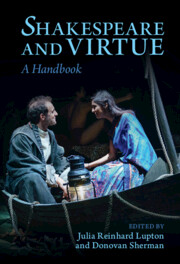Book contents
- Shakespeare and Virtue
- Shakespeare and Virtue
- Copyright page
- Contents
- Contributors
- Acknowledgements
- Introduction
- Part I Shakespeare and Virtue Ethics
- Chapter 1 Aretē (Excellence, Virtue)
- Chapter 2 Dynamis (Dynamism, Capacity) and Energeia (Actuality)
- Chapter 3 Technē (Technical Expertise, Skill)
- Chapter 4 Eudaimonia (Happiness)
- Chapter 5 Ethos
- Chapter 6 Hexis (Habit)
- Chapter 7 Stoicism
- Chapter 8 Skepticism
- Chapter 9 Askesis and Asceticism
- Chapter 10 Shakespeare’s Moral Compass
- Part II Shakespeare’s Virtues
- Part III Shakespeare and Global Virtue Traditions
- Part IV Virtuous Performances
- Works Cited
- Index
Chapter 3 - Technē (Technical Expertise, Skill)
from Part I - Shakespeare and Virtue Ethics
Published online by Cambridge University Press: 19 January 2023
- Shakespeare and Virtue
- Shakespeare and Virtue
- Copyright page
- Contents
- Contributors
- Acknowledgements
- Introduction
- Part I Shakespeare and Virtue Ethics
- Chapter 1 Aretē (Excellence, Virtue)
- Chapter 2 Dynamis (Dynamism, Capacity) and Energeia (Actuality)
- Chapter 3 Technē (Technical Expertise, Skill)
- Chapter 4 Eudaimonia (Happiness)
- Chapter 5 Ethos
- Chapter 6 Hexis (Habit)
- Chapter 7 Stoicism
- Chapter 8 Skepticism
- Chapter 9 Askesis and Asceticism
- Chapter 10 Shakespeare’s Moral Compass
- Part II Shakespeare’s Virtues
- Part III Shakespeare and Global Virtue Traditions
- Part IV Virtuous Performances
- Works Cited
- Index
Summary
Jeffrey Gore’s entry on technē offers a survey of diverse workers throughout Shakespeare’s writing: artisans, lawyers, medical doctors, and educators. It situates the Greek word technē – meaning “technical expertise,” “craft,” or “skill” – within Aristotle’s intellectual virtues in the Nicomachean Ethics as both a pedagogical model (“the craft analogy”) and a marker of social class among different laborers, from “leather apron” craftspeople to elite Latin learners and modern teachers of the liberal arts. In brief accounts of Hannah Arendt’s and Alasdair MacIntyre’s writings on Aristotle, the entry addresses how technē was often believed incompatible with some ancient and early modern notions of citizenship and demonstrates how many of Shakespeare’s characters – such as the “rude mechanicals” in A Midsummer Night’s Dream – challenge us to understand the role of craft in facilitating artistic expression and strengthening political community.
- Type
- Chapter
- Information
- Shakespeare and VirtueA Handbook, pp. 36 - 43Publisher: Cambridge University PressPrint publication year: 2023

